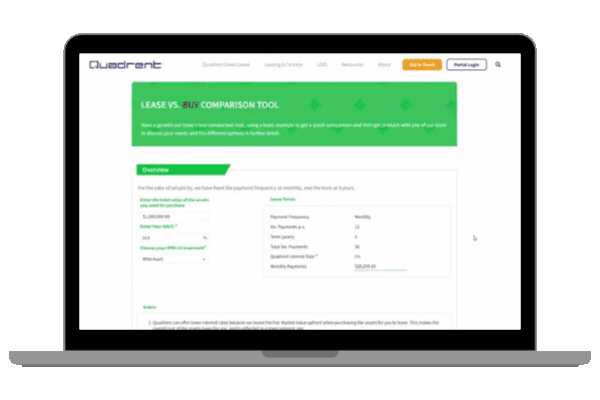UNDERSTANDING LEASING VS BUYING YOUR EQUIPMENT
It can be a tough decision to make, especially when considering that different industries benefit more than others from leasing or buying outright depending on the specific needs of that sector. Therefore, you need to consider the pros and cons in relation to your own unique business.
Lease vs Buy
Ask an expert
At Quadrent, we have a long history of making the complex world of leasing simpler. We work with organisations helping them access assets without sacrificing cash flow and addressing their ESG risk in the process. With a team that has in-depth leasing knowledge and specialised accounting backgrounds, we’ll help you get the most value out of your assets while addressing growing ESG requirements and reporting expectations.
Transfer the ownership risk
By investing in the assets that we lease back to our customers, we assume all the risks of ownership. This includes removal, data erasure, responsible disposal, and value loss.
Cheaper than the bank
Through our investment, we can offer customers asset finance products that are not only environmentally and socially responsible, but are also cheaper than equivalent bank debt rates.
Green Lease
Fund your technology with a Quadrent Green Lease. Built under green loan principles, it aligns with ESG (Environmental, Social, and Governance) standards by incorporating sustainability-focused features and comprehensive ESG reporting. The Quadrent Green Lease ensures that your procurement process not only meets but exceeds environmental criteria, supporting your organisation’s long-term sustainability goals.
Understanding Leasing vs. Buying your equipment
Understanding Leasing vs. Buying your equipment can be complex. Have a go with our online lease vs buy comparison tool today using a basic example to get a quick comparison and then get in touch with one of our team to discuss your needs and the different options in further detail. Our experts are here to help you understand how leasing works and guide you through the best financial decisions for your organisation.
For the sake of simplicity, we have fixed the payment frequency within the comparison tool at monthly, and the term at 3 years.
Further information about why you should be leasing your equipment
How Leasing Works: A Simple and Practical Guide for Asset Management
Leasing is a major corporate financing strategy used across a wide range of businesses and sectors. In this practical guide we break down what a lease is, the different types of leasing, and what you can use leasing for in your business.
Six Benefits of Leasing Over Purchasing Equipment
Here we'll detail how each of these benefits of leasing could be helping your business be more successful and generate more profits: increased cash flow, no end of term ownership responsibilities, reduced costs, up to date technology, managing your capital and debt, and maintaining flexible security over assets.
Why Companies Prefer Leasing Over Buying
Many businesses have embraced the advantages of leasing the equipment they need to run their company rather than purchasing it. Here are some of the biggest reasons why companies prefer to lease: you get more purchasing power, there are 100% finance options, you’re not responsible for maintenance and repairs, and you get your items quickly.
What Is WACC and Why Is It Important?
Ever wondered what the buzz around Weighted Average Cost of Capital (WACC) is all about? Understanding WACC is key to making informed decisions on investing in new projects, as well as influencing a company's capital structure, as it guides the balance between debt and equity financing. A step-by-step breakdown of WACC.
How Do Leasing Companies Make Money?
Leasing companies differentiate themselves by structuring revenue models that ensure the finance agreements (leases) are mutually beneficial — a stark difference to the traditional CAPEX ownership model.
Navigating the Downturn: Mastering Leasing Strategies
Companies can unlock cash flow in several ways, from cost optimisation to diversifying funding sources through leasing their assets. Importantly, leasing can occur on a range of assets without compromising access to the resources required to deliver products and services.
Leasing Technology for Your Company: A Guide to the Leasing Process
Find out how the leasing process works when leasing technology from a specialist leasing company, as well as some key leasing terms you should be familiar with to help you make an informed decision when leasing technology for your company.
Navigating the Complexity of Leasing: What You Need to Know
Technology leasing offers many benefits over paying the full purchase price upfront, including cost savings and flexibility. However, the leasing process can often be complicated and time-consuming, leading to it being an underutilised strategy for many businesses. Here we explore some of the reasons why the leasing process can be so complex.
How Leasing Compares to Buying as an Asset Management Strategy
To understand the benefits of leasing compared with purchasing, it’s important to consider the total cost of ownership (TCO). TCO is an estimate of all the direct and indirect costs involved in acquiring and operating a product or system over its lifetime and is a widely accepted measure for conducting equipment cost assessments.













